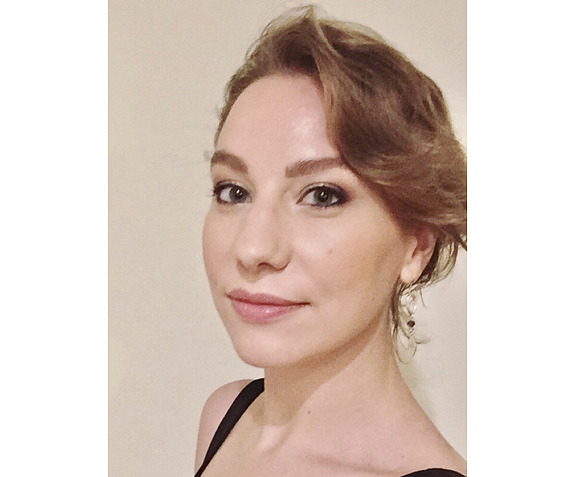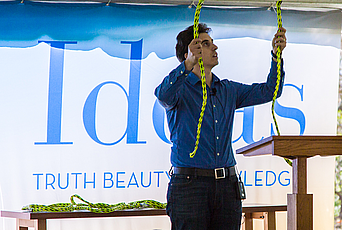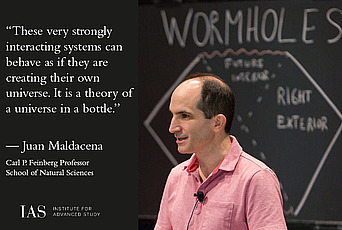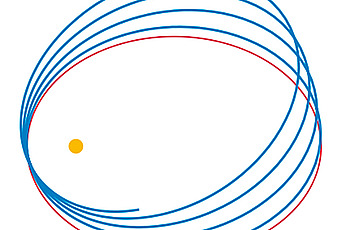Natalie Paquette, Member in the School of Natural Sciences, is a mathematical physicist whose research interests span string theory and quantum field theory. Most recently, she has been exploring connections between holography and the mathematical subject of Koszul duality. Prior to her IAS Membership, Paquette was the Sherman Fairchild Postdoctoral Fellow at the Walter Burke Institute of Theoretical Physics at Caltech.
How do you describe your work to friends and family?
The description depends a bit on the day! Most often, I say that I'm a theoretical physicist interested in understanding the mathematical structures that underlie fundamental physics, particularly string theory. I focus on the mathematical structures because, even though they seem abstruse or formal, they provide a means to develop and sharpen our understanding of basic questions in quantum gravity, particle physics, or condensed matter physics. And quite often, as we see over and over again in string theory, these physical explorations help us learn something new about modern mathematics too. I find the interplay between the two subjects quite beautiful and rewarding.
What question within your field do you most want to answer and why?
I feel I have a solid understanding of something when I know how it should be formulated mathematically
In the back of my mind, I hope to have a more complete description of M-theory (the "parent'' theory of quantum gravity that encompasses the various string theories) and how to understand, e.g., the emergence of spacetime in that theory. I feel I have a solid understanding of something when I know how it should be formulated mathematically, or at least how I would begin to explain it to a mathematician, so my personal predilection is to approach questions that way. But I always hope to stay engaged broadly with outstanding questions in theoretical physics, and hope that some of the questions I end up answering, and the means I use to answer those questions, will surprise me.
Why IAS?
I think just being in proximity to, or collaborating with, great thinkers can have salutary effects on one's own thinking. The IAS has a critical density of experts with whom I haven't had the chance to interact yet in my academic life, so the offer presented a great opportunity.
It's also essential for me to have a lot of intellectual stimulation outside of physics, and I'm excited to learn from, and interact with, the scholars across all schools and subjects at the IAS.
Can you describe a high point and/or low point in your academic career and explain how this may have influenced your work?
Rather than focusing on one or two clear high points, I like to think about the many bright spots in my day when I feel that I finally learn or understand something properly, get a satisfying answer to a computation, or become excited about a new idea. Experiencing those bright spots has just reinforced my conviction to work on the topics and ideas that I like and make me happy, irrespective of trends or sociology. As it happens, the low points reinforce the same lesson.

What is one of your interests or passions outside of academia? Has this had a bearing on your work?
I'm a combat sports fan. I train Muay Thai and also a bit of Western boxing, and I like to study fights. Prior to the pandemic, I was in the gym 2 hours every day. Many (even most) aspects of training and sparring are mental, and as a result my equanimity under pressure or duress, in their myriad forms, has improved a lot.
Where is your favorite place to think?
I recently moved from Pasadena, California, where there was a lovely underground wine bar called The Cellar, which had shelves full of books, wood paneling, chess boards... It also crucially didn't have an internet connection, so if I wanted to do a computation, read, or work on a draft it insulated me from a lot of distractions. I'll be on the hunt for a substitute when the state of the world allows.
Has the pandemic added any new dimensions to your research? If so, please explain.
I don't think the pandemic has added any substantial new dimensions to my research (except for the constant struggle to mark the passage of time, which I think we all face).
What is your hope for the future?
I have many! To pick one: I'd like to see substantial improvements to the American public school system in my lifetime. I think we let too much talent slip through the cracks due to the huge variations in school quality.



